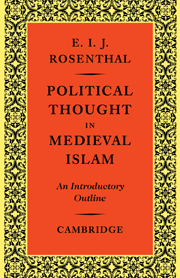Book contents
- Frontmatter
- Contents
- AUTHOR'S NOTE
- ABBREVIATIONS
- INTRODUCTION
- PART I CONSTITUTIONAL LAW AND MUSLIM HISTORY
- I THE QUEST FOR HAPPINESS
- II THE CALIPHATE: THEORY AND FUNCTION
- III GOVERNMENT
- IV THE THEORY OF THE POWER-STATE: IBN KHALDŪN'S STUDY OF CIVILIZATION
- PART II THE PLATONIC LEGACY
- APPENDIX: SOME TURKISH VIEWS ON POLITICS
- NOTES
- GLOSSARY
- INDEX
- Frontmatter
- Contents
- AUTHOR'S NOTE
- ABBREVIATIONS
- INTRODUCTION
- PART I CONSTITUTIONAL LAW AND MUSLIM HISTORY
- I THE QUEST FOR HAPPINESS
- II THE CALIPHATE: THEORY AND FUNCTION
- III GOVERNMENT
- IV THE THEORY OF THE POWER-STATE: IBN KHALDŪN'S STUDY OF CIVILIZATION
- PART II THE PLATONIC LEGACY
- APPENDIX: SOME TURKISH VIEWS ON POLITICS
- NOTES
- GLOSSARY
- INDEX
Summary
THE VIEWS OF A UTILITARIAN MORALIST
Siyāsa, government, is determined by the Sharīʿa and, according to the Muslim jurists, falls to the caliph or imām. But whilst the Islamic, that is the religious and political, character of the state is assumed as a matter of course by all Muslim writers, jurists, historians, philosophers and moralists, the meaning and content of siyāsa undergo significant changes in the course of Islamic history and under the impact of the decreasing coherence of the Abbasid caliphate. The imāma, though presupposed, gives way to the mulk, literally “kingdom”, in the thought and reflections of writers on morals and politics. They are interested in the actual state and principally in its effective ruler. (Siyāsa as siyāsa madanīya, politics, as seen by the Muslim philosophers influenced by Plato and Aristotle, will occupy us later in this book.)
This can easily be seen in the Al-Fakhrī of Muḥammad b. 'Alī b. Ṭabāṭaba known as Ibn Al-Ṭiqṭaqa. The book was written in 1302 for, and named after, the ruler of Mosul “who governs the people and directs the affairs”. Its main part is a straightforward history, from the first four caliphs to the last of the Abbasid caliphs. It is of little originality, but, through its practical purpose as a guide for his prince, of some importance. Its utilitarian tendency is reinforced by an introduction dealing generally with “royal politics”.
- Type
- Chapter
- Information
- Political Thought in Medieval IslamAn Introductory Outline, pp. 62 - 83Publisher: Cambridge University PressPrint publication year: 1958



